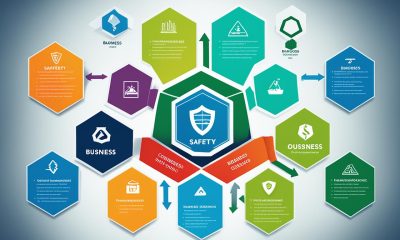Achieve Your Financial Independence Journey
Welcome to the world of financial independence. This is where the pursuit of freedom and security meet. We’re going on a journey to reach financial freedom.
With the right strategies and careful planning, you can create a future of financial stability. Imagine a life filled with peace of mind thanks to your financial independence.
Key Takeaways:
- A financial independence journey is about achieving freedom and security by setting clear goals and making smart investment choices.
- Setting financial goals is the first step towards financial independence, helping you develop a wealth accumulation strategy aligned with your aspirations.
- Investing wisely is crucial in building wealth and generating passive income.
- Early retirement planning is a common aspiration, and we will discuss effective strategies for planning and cultivating a mindset that supports financial independence.
- Passive income streams are essential in achieving financial independence, and we will explore various avenues for generating passive income.
Setting Financial Goals for Your Journey
Starting your journey toward financial freedom? It’s crucial to set clear financial goals first. These goals act like a roadmap, guiding your journey. They help you decide your financial aims and how to get there.
Planning your financial goals is more than a one-step process. Think about what you really want. This could be buying a house, starting a new business, retiring early, or just wanting to feel secure. By setting SMART goals, you’re on a path to success.
To build a plan that matches your dreams, follow these important steps:
1. Assess Your Current Financial Situation
Start by looking at where you stand financially. Check out your income, spending, and debts. This gives you a true picture of your financial health and shows where you need to improve.
2. Define Your Financial Goals
Now, detail your financial goals. Be clear about what you’re aiming for and when you want to achieve it. Clarity is key, whether it’s getting out of debt, saving for a house, or planning for retirement.
3. Prioritize Your Goals
After you’ve outlined your goals, decide which are the most critical. Figure out which ones you want to hit first. This helps with planning and making sure you focus your money where it matters most.
4. Break Down Your Goals into Milestones
Split your goals into smaller steps. This makes them easier to manage and lets you see your progress. Celebrate every win to motivate yourself to keep going.
5. Create a Budget and Savings Plan
A smart budget and savings strategy are vital. Make a budget that fits your goals and stick to it. Decide how much to save each month and find ways to save more.
6. Explore Investment Opportunities
To grow your wealth faster, look into investing. Think about adding stocks, bonds, and real estate to your portfolio. Choose investments that match how much risk you can take and your financial goals.
Remember, the journey to financial independence needs regular updates and discipline. Keep checking and adjusting your goals as things in your life change. Stay focused, and financial freedom will be within reach.
Making Smart Investment Choices
Making smart investment choices is key to financial independence. Investing wisely can build wealth and create passive income. This helps you reach your financial goals over time. This section covers various investment options and tips for informed decisions.
Exploring Investment Opportunities
Understanding different investment opportunities is important before you start. The market has many options like stocks, bonds, real estate, and mutual funds. These cater to various risk levels and income goals.
Do thorough research to find what fits your journey to financial independence. Look for options that balance good potential returns with risks you’re okay with taking.
Seeking Professional Guidance
Investing can seem complex at first. It’s wise to get advice from financial advisors or wealth managers. They offer insights and help tailor a strategy for you.
Experts know the market well and can guide you to smarter choices. This can boost your chances for income from investments.
Diversifying Your Portfolio
Diversification is vital for smart investing. It means spreading out your investments to reduce risks and possibly increase returns. This strategy helps smooth out the ups and downs of the market.
“Diversification is an essential strategy for optimizing returns and minimizing risks in your investment portfolio.” – John Smith, Financial Advisor
Build a portfolio with a mix of stocks, bonds, real estate, and more. This ensures steady income and growth of your wealth over time.
Staying Informed and Adapting
Successful investors always stay updated on market trends and economic news. Watching your investments closely helps spot when to adjust them. This keeps your strategy aligned with your goals.
The investment world changes fast. Being ready to update your strategy is crucial. This makes your investment choices more effective.
Smart investment choices lead to passive income and faster financial independence. Always diversify, seek expert advice when necessary, and adjust your strategy for the best returns while managing risks.
Strategies for Early Retirement Planning
Many people dream of retiring early. They want to quit working sooner and enjoy their time. Achieving this goal means planning carefully and adopting a mindset focused on financial independence. We’ll discuss how to prepare for early retirement and maintain long-term financial health.
Create a Clear Retirement Plan
For early retirement, having a detailed plan is crucial. Begin by setting your retirement goals. These should include the age you wish to retire and the lifestyle you aspire to maintain. Think about expenses like housing, health care, and hobbies. A thorough plan helps you figure out how much you need to save.
Save Consistently and Maximize Contributions
Building a retirement fund requires regular savings. Save a part of your income for retirement every month. Use automatic transfers to keep your savings consistent. Benefit from retirement accounts like 401(k)s or IRAs for tax advantages and potential employer matches. Aiming to maximize these contributions will help grow your savings faster.
Diversify Your Investment Portfolio
Spreading your investments can reduce risk and increase returns. Diversify by investing in stocks, bonds, real estate, and more. This approach lowers the risk and can enhance growth. Consulting a financial advisor can help tailor your investment strategy. They’ll align it with your retirement goals and how much risk you can handle.
Minimize Debt and Live Below Your Means
Key to early retirement is reducing debt and spending wisely. Focus on eliminating high-interest debts, such as credit card balances. Embracing a frugal lifestyle allows you to cut back on expenses. This will boost your savings rate and help build your retirement fund quicker.
| Financial Independence Strategy | Benefits |
|---|---|
| Create a Clear Retirement Plan | – Establishes clear goals and direction – Provides a roadmap for savings – Helps determine required savings amount |
| Save Consistently and Maximize Contributions | – Builds retirement savings over time – Takes advantage of tax benefits and employer matching – Accelerates wealth accumulation |
| Diversify Your Investment Portfolio | – Reduces investment risk – Enhances potential returns – Provides exposure to different asset classes |
| Minimize Debt and Live Below Your Means | – Reduces financial stress – Increases disposable income for savings – Improves overall financial health |
Adopting these strategies and a mindset of financial independence sets the foundation for early retirement. Achieving financial freedom takes discipline, determination, and a vision for the future. Begin acting on these strategies now to turn your early retirement dreams into reality.
Maximizing Passive Income Streams
Generating passive income is key to financial freedom. It means making money with little work or time. In this section, we’ll look at ways to make passive income. We’ll also share tips on smart investment choices to grow your wealth.
Real estate is a top way to make passive income. You can invest in rental homes or REITs to get rental money or dividends. Real estate is a solid investment over time. It’s a good choice for passive income.
Then, there’s dividend investing. This is when you own company shares that pay you part of their profits regularly. Picking dividend stocks that consistently pay well can give you a steady passive income.
If you like the digital world, online content can also earn you money. This might mean starting a blog or YouTube channel. Or selling digital goods or courses. Or using affiliate marketing. Good content and marketing can pull in many people. Then, you make money through ads and selling stuff.
Peer-to-peer lending platforms are worth checking out too. They match people who need a loan with investors like you. You make interest on your loans. By choosing various borrowers wisely, you can cut down on risk and make more passive income.
To make the most of passive income, you have to choose investments wisely. Do your homework and think about risks. You might also want to get advice from money experts. Seeing good returns on passive income takes some work at the start. And you’ll need to keep an eye on your investments.
Key Points:
- Passive income helps you become financially independent.
- Options include real estate, dividends, online content, and peer-to-peer lending.
- Research and professional advice are key to smart investing.
Strategies for Wealth Accumulation
Building wealth is key to financial independence. Using smart strategies helps secure a stable financial future. We’ll explore saving, budgeting, and investing to meet your financial goals.
Saving: Your Foundation for Financial Success
Saving money is a crucial step in growing wealth. By setting a budget and saving part of your income monthly, you can build wealth over time. Set clear savings goals and check your progress to stay on target.
“Saving money allows you to take control of your financial future and provides a safety net for unexpected expenses.”
Budgeting: The Key to Financial Discipline
Budgeting is also vital for growing your wealth. Creating a budget shows your income, expenses, and goals clearly. This helps make wise spending choices and find ways to save more.
“A well-planned budget empowers you to make intentional financial choices and prioritize your long-term goals.”
Making Smart Investment Choices
Investing is crucial for increasing your wealth. Choose investments that match your risk tolerance and goals. Diversify your portfolio to lower risk and aim for higher returns.
“Smart investment choices allow your money to work for you and generate additional income over time.”
Invest in stocks, bonds, real estate, and more. Do your research and get advice to make the best investment decisions.
Review and Adjust Your Strategy Regularly
Remember, wealth strategies can change. As markets and personal situations shift, review and update your approach. Stay up-to-date with financial trends and adjust your investments as needed.
Wealth building takes time, patience, and discipline. By following these strategies and choosing wisely, you’re on your way to financial independence and securing a bright future.
Maintaining Financial Independence
Getting financial independence is one thing, keeping it is another. It’s vital to keep the mindset that got you there. Develop habits that make sure you succeed with money in the long run.
Staying educated about finances is crucial. Finance changes all the time. To keep up, you should keep learning. Read up, attend seminars, or follow respected financial blogs. Commit to learning always.
Being flexible is key too. The economy can change fast. Watch the market, spread your investments, and be ready to make smart choices.
The Benefits of Networking
Networking is super important for keeping your financial freedom. Being around people who think like you helps a lot. In financial groups, you can share and learn new money tips. This can really help your financial success.
“Surround yourself with only people who are going to lift you higher.” – Oprah Winfrey
The Power of Consistency
Staying consistent is crucial. Always stick to your budget. Check your investments often and set clear financial goals. Being disciplined keeps you on track for success and security.
Financial independence isn’t a one-time thing; it’s a lifelong journey. Keep a strong mindset, always be learning, and stay flexible and consistent. This way, you’ll keep enjoying financial freedom for many years.
Conclusion
Starting your financial freedom journey is both rewarding and needs a lot of hard work. It’s essential to have clear goals and smart investment plans. This way, you can secure a future that’s free from financial worries. Being consistent in generating passive income and keeping a financial independence mindset are key.
We have looked at different ways to achieve financial independence in this article. They include building wealth, planning for early retirement, and increasing passive income. Combining these with a proactive financial attitude can lead to the freedom and security you aim for.
Your financial journey is personal. It’s important to look at where you are now, set achievable goals, and come up with a plan that matches your dreams. Keep an eye on various investment options and stay flexible to economic changes. With dedication to learn and the right attitude, you’ll be ready to start your path to financial independence.
FAQ
What is a financial independence journey?
How can I achieve financial freedom?
Why is goal-setting important in financial independence?
How can I develop a wealth accumulation strategy?
What are smart investment choices?
How can I generate passive income?
What strategies are useful for early retirement planning?
How can I maximize my passive income streams?
What strategies can I use for wealth accumulation?
How can I maintain financial independence?
-

 Financial Education11 months ago
Financial Education11 months agoEmpowering Your Future with Financial Education
-

 Financial Education11 months ago
Financial Education11 months agoBoost Your Credit Score Improvement Tactics Now
-

 Financial Market11 months ago
Financial Market11 months agoRisk Assessment Strategies for Business Safety
-

 Financial Market11 months ago
Financial Market11 months agoEssential Guide to Economic Indicators 2023
-

 Financial Market11 months ago
Financial Market11 months agoMaximize Wealth with Smart Investment Strategies
-

 Financial Market11 months ago
Financial Market11 months agoSmart Retirement Planning Strategies for You
-

 Credit Cards11 months ago
Credit Cards11 months agoEssential Fraud Protection Strategies for Security
-

 Financial Market11 months ago
Financial Market11 months agoStrategic Asset Allocation Guide for Investors

